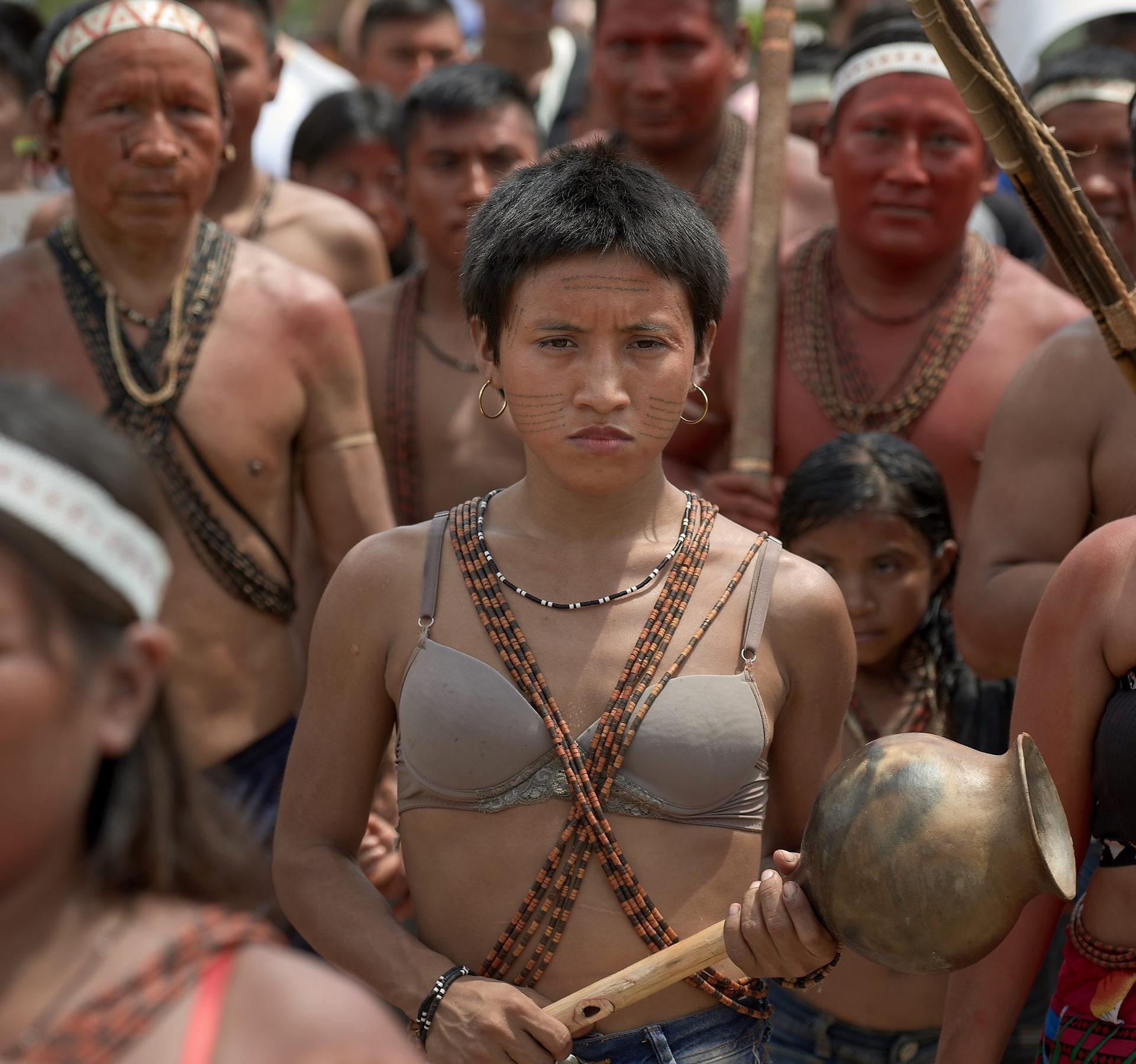ALTAMIRA, Brazil — Brazil celebrated its national day of indigenous peoples April 19, and church workers say the fact that it was on Good Friday was a fitting reminder of the discrimination and violence still faced by descendants of the country’s original inhabitants.
The government of President Jair Bolsonaro, who took office in January, has weakened the agency responsible for protecting indigenous peoples, publicly opposed constitutionally mandated demarcation of indigenous territories, and proposed opening up indigenous lands for mining and other natural resource extraction.
“There are two ways of looking at land — the vision of land for life, and the vision of land for business,” retired Bishop Erwin Krautler of Altamira told Catholic News Service. “These two visions are in conflict.”
Indigenous people, he said, “defend their land as a place of myth and ritual, of life, of their ancestors, who are buried there.”
But business interests tend to view land as a commodity to be bought and sold, with natural resources to be exploited, without taking into account the people who live there, he said.
“Without land, indigenous peoples do not exist, and they will cease to exist if they lose it,” the bishop said.
His words echo those of Pope Francis, when he spoke to several thousand Amazonian indigenous people during his visit to Peru in January 2018.
“Your lives cry out against a style of life that is oblivious to its own real cost,” the pope said, with a harsh rebuke to government officials who claim indigenous people have too much land and are an obstacle to development.
Indigenous communities throughout the Brazilian Amazon suffer invasion from illegal gold miners, loggers and ranchers, according to the Brazilian bishops’ Indigenous Missionary Council, CIMI, which supports indigenous people in their struggle for respect for their rights.
Many of those rights, including the right to territory, are enshrined in the constitution. By stalling the demarcation of indigenous lands, the new government is violating the constitution, Krautler said.
Latentes, a Brazilian conflict-mapping project, has recorded at least 428 latent conflicts involving mining companies, indigenous communities and communities called quilombos, inhabited by people descended from escaped slaves who fled into the forest and established secret settlements.
Government agencies established to protect indigenous communities are also under attack.
The National Indian Foundation, the agency responsible for indigenous affairs, used to be a branch of the Ministry of Justice. The new government split it, however, placing territorial matters under the Ministry of Agriculture, Livestock and Supply.
CIMI workers say that will weaken protection against efforts by ranchers and industrial agriculture companies to claim land in territories that have not yet been demarcated.
In March, a federal government proposal to shift responsibility for indigenous health care to municipal governments triggered protests by indigenous people throughout the country. The Indigenous Health Service serves remote communities where health facilities are sparse, as well as indigenous residents in some cities.
In the small town of Atalaia do Norte, not far from the triple border shared by Brazil, Peru and Colombia on the Amazon River, people from the adjoining Vale do Javari indigenous territory painted their faces and bodies and donned traditional dress for a protest march to the local office of the Indigenous Health Service.
Inside, health coordinator Jorge Marubo, 43, a Marubo Indian, was sympathetic to the protest. Efforts to shift certain services to municipal governments in the past have failed, because funding could not be guaranteed, he said.
The Bolsonaro government “is tearing down everything we have won over years and years,” he said, adding that if indigenous health services are shifted to municipal governments, “many indigenous people will die.”
Budget cuts, some of which began before the new government took office, have also undermined indigenous rights. Shortages of funding and staff have forced the National Indian Foundation to close guard posts established to protect areas inhabited by semi-nomadic groups that shun contact with wider Brazilian society.
One post, in the Vale do Javari territory, was reopened recently after reports of the possible killing of isolated people by gold miners working illegally in the reserve.
Many isolated groups are descendants of indigenous people who fled deep into the forest to escape the violence of rubber barons who enslaved workers and killed or maimed them if they failed to meet rubber production quotas. Because of their isolation, those people have no immunity even to illnesses such as flu or the common cold.
Rolling back policies aimed at protecting them would amount to genocide, human rights defenders say.
The new government’s policies appear aimed at absorbing indigenous people into Brazil’s more European society, rather than helping them maintain their traditional lifestyles and culture, Krautler said.
Because indigenous youths who move to cities for higher education often give up their traditions to fit in, indigenous students at the Federal University of Western Para in Santarem created an organization to support one another.
In early April, the students staged a sit-in at the university to protest delays in and threatened cuts to a federal government subsidy of about $236 a month, which they say is crucial for enabling indigenous young people to study.
Amid the somber news, however, there are signs of hope, church workers say. Brazilians recently elected the first indigenous woman ever to take a seat in congress. Joenia Wapichana was elected to the lower house of congress from Roraima, a state that is also home to the 6,500-square-mile Raposa Serra do Sol indigenous territory, which Bolsonaro has said he would like to open up to mining.
The Synod of Bishops for the Amazon in October at the Vatican will hear indigenous people’s concerns, which have been raised in presynod assemblies in the Amazonian countries, Krautler said.
At a gathering in February, sponsored by the Pan-Amazonian Church Network, indigenous people from Peru, Colombia, Ecuador, Brazil and Bolivia urged the Church to accompany them in their struggle to protect their land and ways of life.
















